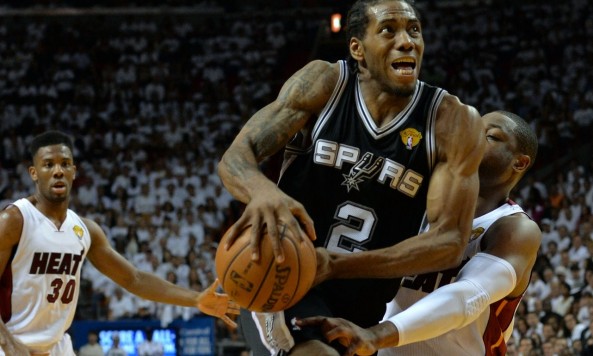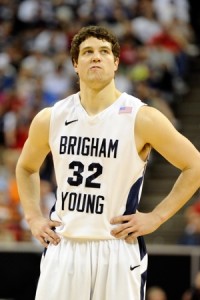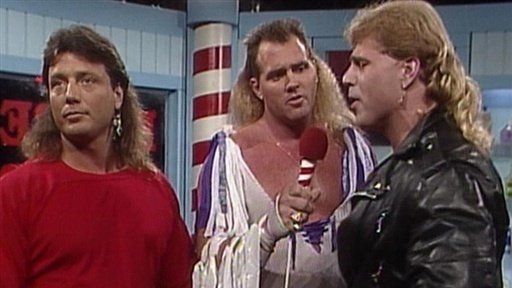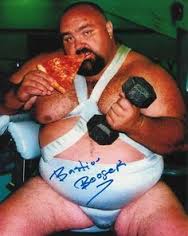The San Antonio Spurs have a pretty solid track record of fitting round pegs into square holes. Outside of Tim Duncan, and David Robinson before him, many of their key players shouldn’t belong… at least, not in the way we assumed they would at the time.
Tony Parker (1st round, 28th overall pick) was once thought to be a major liability for San Antonio, to the extent that the media pushed for him to be traded for an aging Jason Kidd. However, he has worked out just fine. Danny Green (2nd round, 46th overall pick) wasn’t predicted to be a key player for any NBA franchise. At best he was to be a journeyman. Of course, the Spurs found him a spot on their team. Of course, he has worked out terrifically. Manu Ginóbili (2nd round, 57th overall pick) went from being a “bordering on undrafted” foreign basketball prospect into one of the biggest reasons for the franchise’s early runs of dominance a decade ago.
Wait. Breathe. There’s more…
Patty Mills (2nd round, 55th overall pick) was another presumed “eh” late-second round selection (insert shoulder shrugging motion here) who turned out to be a great find for the organization. The Spurs even managed to make the chubby version of Boris Diaw, a guy nearing a point of his career that would almost certainly result in him being booted from the league, into a highly productive and relevant figure.
It is a recurring theme with the Spurs. It is why we trust them so much to the point of blindly following their draft picks and free agent signings. Basically, if someone is drafted or signed to play for them, he’s going to do alright for himself. San Antonio has essentially become a home for those who would otherwise be without a basketball-playing shelter.
Now there’s Kawhi Leonard.
This is a player who was passed up in the 2011 NBA Draft for guys like Derrick Williams, Jonas Valančiūnas, Jan Veselý, Bismack Biyombo, Jimmer Fredette, and a few other selections who in hindsight seem like terrible mistakes.
People questioned what Leonard would bring to the NBA. Many thought he would be a tweener, a player who could not shoot well enough to become a multi-dimensional force, and a prospect who — at best — had a high floor but a low ceiling.
Ummmm, almost everyone was wrong.
Sure, people will now pretend that they knew Leonard was going to be good, but I doubt anyone could even lie to themselves enough to act as if they knew he would be such a good player that he has become what Duncan was before him — the transitional superstar. Leonard is now the player who can take the Spurs through the end of one era while moving it along to the next.
Don’t get this story twisted around in your mind. Just as Duncan came towards the end of the Robinson era, then helped propel the Spurs to even more success, is something Leonard has yet to do. Honestly, it will be hard to duplicate the level of success Duncan brought to the Spurs at the end of the Robinson era and into his own. The bar is set incredibly high by Duncan, but that doesn’t mean Leonard’s brilliance should be discounted. He is attempting to play alongside, and then follow, one of the best basketball players to ever roam the planet.
We have reached a weird point in his young career, though. Many have already started to acknowledge Leonard as a superstar, while others seem far more hesitant to do so. The latter group looks at his box-score averages, coupled with San Antonio’s regular ability to max out marginal players to the point of making them vital to the team’s success, and think he is simply a product of the Gregg Popovich system.
That might have seemed like a fair-to-decent argument a few years ago, but it should no longer be the case. As Duncan, and other stars on the team to some extent, have had more inconsistent flashes of their previous (and more sustained) excellence, it is Leonard who has carried the flag for this organization for almost two full years.
Is he a top-10 player in the NBA? I am not sure. Going through and naming guys we would “prefer to build our fictional franchises around” seems more like a fun theoretical practice than something that can be discussed objectively. Heck, we have people who view Jimmy Butler in the same space as Leonard.
While Butler is great and all, he’s not nearly as transcendent a player as Leonard. Maybe he’s as impactful to Chicago as Leonard is to the Spurs, but to compare the two as franchise building blocks would be like considering Marty Jannetty the equal to Shawn Michaels.
Yes, the two are similar for their two-way styles of play, and Butler has become a far better player than anyone could have imagined. Yet, not only is Butler eventually going to suffer from playing 46 minutes per game, but Leonard is still two years younger than him — without the wear and tear brought about by extended minutes. It could also be argued that Kawhi already has more assets in his overall arsenal, and has continued to showcase the rare ability to outperform expectations in the postseason.
Again, to clarify: Jimmy Butler is great. In the regular season and the postseason. He’s just not Kawhi Leonard, and there’s not a single thing wrong with that.
Doubling down on the already used WWE analogy: Not only is Kawhi Leonard a budding — but, really, probably already — superstar, he wants nothing to do with being one. Much like Duncan has been hesitant to relish the limelight, Leonard is a mystery in all the fun ways. Much like many WWE stars, Leonard has become an antihero.
*
Fans will regularly eat up NBA players who star in commercials, give tremendous postgame pressers, and hurl fun tweets at us 140 characters at a time. Leonard doesn’t do any of that (he does give a fun presser here and there, though). He’s viewed by many as just a guy playing basketball, and we should really start to enjoy him for being an alternative to the normally consumable star.
Stone Cold Steve Austin wasn’t some guy booked from parts unknown. He was a dude who liked to drink beer and kick butt. Wrestling fans weren’t actually supposed to like him. Austin was someone who showed bad-guy tendencies more than good-guy inclinations, who raged against the corporate machine. Fans ended up loving him because they could relate to him in more — and different — ways than normal stars.
Now, Leonard isn’t raging against his own organization, nor is he some loud dude yelling into a microphone, but he is doing things completely opposite of how we have come to expect “superstars” to act. He is raging against the idea of being a superstar simply by ignoring all the things that come with the label.
That doesn’t make him better than those who do take advantage of their talents and parlay them into financial success or brand-building. Leonard is the NBA’s alternative superstar, though — for the people who grow tired of the Nick Youngs of the world, who don’t back up their shenanigans with wins and on-court play. Kawhi rises above players once presumed to be at his level, such as Kevin Love, who couldn’t quite fit correctly with other stars before he got injured.
Is Kawhi Leonard a new LeBron James? Of course not. There are certainly a slew of players better than him. Anthony Davis, Steph Curry, and a few others immediately jump to mind. I am even, regrettably, willing to listen to a smart debate between him and Jimmy Butler if there are good ones out there. However, that doesn’t change what Leonard is: a very good basketball player who encompasses a lot of personal traits that many have long claimed they wanted in a superstar.
For every Nike commercial, self serving Tweet (or column), and look-at-me star out there (in some cases, “look-at-me stardom is legitimate and not a problem), just remember there’s an NBA antihero alternative out there. His name is Kawhi Leonard… and it is rather scary to think that he’s really just getting started.




